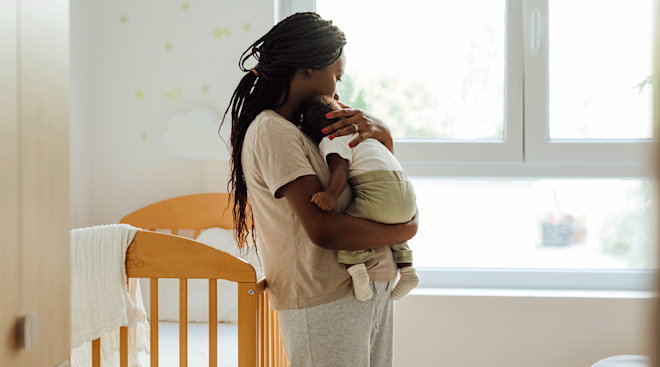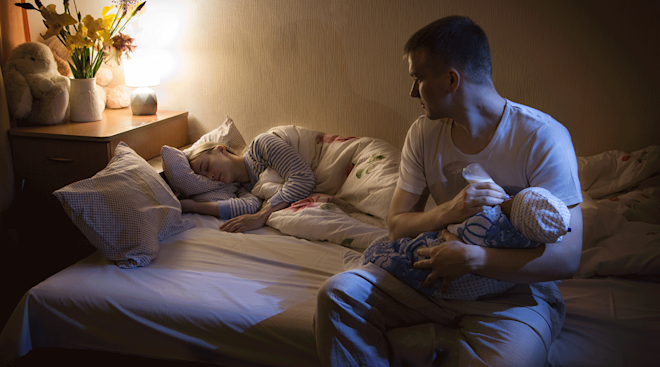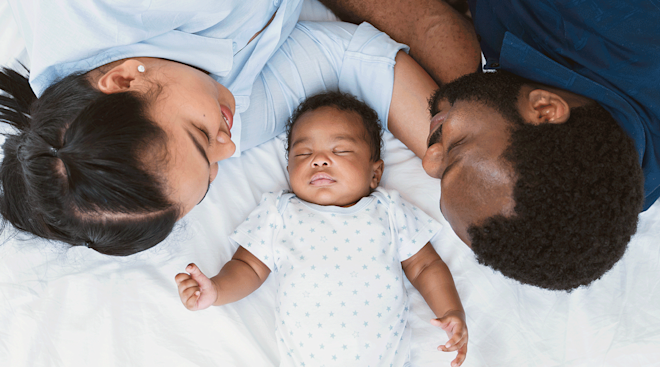How to Deal With Baby’s Witching Hour
Baby’s witching hour—that chunk of time at night when an otherwise content baby starts fussing incessantly—will undoubtedly haunt many a new parent. What’s especially scary is that baby’s witching hour always seems to coincide with when you’re most tired: It hits when you’re just starting to relax after dinner and sometimes when you’re sleeping. The good news? If your little one is healthy and doing well, their infant witching hour days are numbered—we promise. Read on for expert tips on how to get through the worst episodes of a fussy baby at night.
According to European folklore (and Shakespeare, who wrote about “witching time” in Hamlet), the witching hour was coined for midnight or the hour between 3 a.m. and 4 a.m. when the Catholic church didn’t have any prayers or services going on—an optimal time for evil spirits to materialize. While the phrase can be used to describe any random span of bad luck, it lends itself really well to newborn babies 2 to 3 weeks old, who get fussy at a certain time of day on a regular basis (maybe even daily) for seemingly no reason. (Newborns haven’t learned their day-to-night cycles yet, so they aren’t prone to a specific newborn witching hour.) It can peak around 6 weeks old, says Jillian Thistel, a certified pediatric sleep consultant and founder of Twinkling Stars Pediatric Sleep Consulting in Ontario, Canada. During the witching hour, baby may be extra fussy, difficult to calm, cry more and have trouble sleeping.
While it may be incredibly frustrating for you, infant witching hours are developmentally normal, explains Rachel Mitchell, a certified pediatric sleep consultant and founder of My Sweet Sleeper. “It’s a stage that most babies will experience in the first few months of life.”
Typically, baby’s witching hour occurs in the evening, some time between 5 p.m. and 11 p.m. says Thistel. Wondering why baby gets fussy at night? Keep reading for expert answers.
The million-dollar question: What causes the newborn witching hour? Unfortunately, experts don’t have a clear answer. “Sometimes there’s no rhyme or reason for babies being fussy, and they reject soothing, which can be frustrating for parents,” Mitchell explains. “Parents should know that this isn’t their fault, and while they can do things that may help, they can’t necessarily prevent it.” In truth, the infant witching hour could be caused by a multitude of things. Below, the experts share some of the factors that could play a role if you have a fussy newborn at night.
-
Overstimulation: While adults may find the evening hours to be quieter and more relaxing, they’re actually quite stimulating for young infants. During these hours parents may be coming home from work, siblings from school, the family may be getting dinner read and siblings may be getting ready for bed, Thistle notes. Once baby’s overstimulated, they don’t know how to calm down and self-soothe, “so they need to scream and let it go,” adds Andrew Bernstein, MD, a pediatrician in private practice in Evanston, Illinois. Remember that infants are hypersensitive to all the new sounds and activities going on around them—the crying is sometimes a sign that baby just wants to be wrapped up and held close.
-
Overtiredness: Babies naturally become “more tired as the day goes on,” Mitchell says—and if baby hasn’t napped enough during the day, they may be overtired by the time bedtime rolls around. (This is when babies are extra tired, but because their nervous system hasn’t fully matured, they don’t know how to put themselves to sleep.) Or maybe you’re unintentionally keeping baby up to spend time together as a family. “Part of the witching hour is recognizing that sometimes babies just need to go to sleep around 6 or 8 at night,” Bernstein says.
-
Discomfort: While older children and adults can verbalize and fix the things that bother them, newborns can’t. The best way newborns can communicate discomfort is through cries. Perhaps they have indigestion or are gassy, Thistel says. If you’ve got an extra fussy baby at night, walk through your checklist to see what could be bothering them.
-
Hunger: Another possible reason behind the witching hour in baby could be hunger. According to Thistel, many newborn babies often want to cluster feed in the evenings. However, “Your prolactin levels drop, [so] you’re making less milk,” explains Meigan Alexander, a certified lactation consultant in Charlotte, North Carolina. When babies want more milk but it’s not coming fast enough, they can get frustrated as the milk release slows down. By crying, “babies are doing what they need to do to get what they need—being upset is a baby’s way of asking [for what they want]; they don’t have another way to express it,” Alexander adds.
When do babies outgrow the witching hour? There’s not necessarily a specific age when babies grow out of fussing at night, rather the experts note there’s a range for when it may happen. Thistel says baby’s witching hour behavior slowly starts to improve around 3 to 4 months. Bernstein says that after about 2 to 4 months of age, you may have an easier time preventing baby from getting overtired, which, in turn, would ward off the witching hour. At this point, “you can do some sort of sleep training; that’s when babies can start recognizing patterns and start to learn self-soothing,” he says. Plus, by around 6 months old, “most babies are happy getting 12 hours of sleep at night without needing a feeding,” he adds, which may also help with the witching hour.
While baby’s witching hour is developmentally normal, it’s never easy for a parent to watch their little one cry. Wondering how to calm a fussy baby at night? It’s really all about “trying different soothing strategies to figure out what will work well for baby,” Thistel says—and know this will look different for everyone, Mitchell adds. To help you and baby get through this difficult stage, check out the following baby witching hour tips from experts:
-
Make sure baby gets enough sleep: Babies, particularly newborns, need a lot of sleep—in fact, they’ll spend more time asleep than awake for those first couple of months. Help them get in plenty of shut-eye during the day, both experts say, since an overtired baby has a harder time falling asleep at night.
-
Take baby to a quiet, dark room: By limiting stimulation when they’re upset, baby will have an easier time calming down, Thistel says. A white noise machine or app may help too.
-
Try a swaddle: Swaddling is comforting to newborns because it reminds them of the womb. Thistel suggests also shushing, swaying and rocking a swaddled baby, as well as offering them something to suck (like a pacifier).
-
Give them lots of snuggles: Skin-to-skin contact lets baby smell you, which can help calm them. Thistel’s recommendation for keeping baby close while still being able to tackle your endless to-do list? Babywearing.
-
Nurse baby as much as they want: Not only will this help baby feel satisfied, but the sucking motion also helps calm baby down, both experts say.
-
Pay attention to the timing of baby’s witching hour. If they experience increased fussiness after a feeding, it could be stemming from a sensitivity to the formula they’re eating, Mitchell explains. Or, baby may be reacting to something they’re not tolerating well in your breast milk, Thistel adds. If you think baby’s witching hour may be related to their feedings, consult with your pediatrician.
-
Establish a bedtime routine: Healthy sleep habits start at an early age—earlier than you might think. Bedtime routines can actually start in the newborn stage—and they don’t have to be elaborate. You can start with a bath and end with a book or lullaby. Eventually, baby will come to expect the routine and feel calmed by it.
-
Try to prepare for baby’s witching hour: This may not always be possible, but if parents notice any patterns for when or why baby goes through a witching hour, then they can try to get ahead of it. “Make sure their needs are met,” Thistel says.
-
Ask for help: Be gracious to yourself—and baby—and ask for support. “Tag team and make sure you and your partner are taking care of each other and each getting time apart from the baby,” Bernstein says. “One parent can go take a walk while the other deals with [baby for] as long as they can handle it.” Thistel also suggests reaching out to other loved ones for support to allow both parents space as needed.
-
Step away when you need to: Sometimes the best thing you can do when dealing with an inconsolable newborn is step away. “Set baby down somewhere safe (such as a pack-and-play or a crib) and step away to take a few deep breaths,” Thistel says. “Try to focus on ways to calm yourself, as well.” After all, you’re probably a lot better at calming baby when you’re calm yourself.
“Remember that it may take some trial and error, along with some practice to find out what each baby takes well to during the witching hour,” Thistel says. And even after you’ve found what they best respond to, know “it may not calm them down right away, so don’t get discouraged,” Mitchell adds.
“If parents feel that their baby is rarely content, and spends a large chunk of the day crying, or their baby is meeting the criteria for colic, it’s always helpful to consult with a pediatrician to rule out any other causes for the crying,” Thistel says. Additionally, if baby’s displaying any other symptoms related to illness, such as refusing to eat, vomiting, fever or anything else unusual, it’s time to see the doctor. But, even without any other signs, if you have a gut feeling something else might be going on, trust your instincts.
Unfortunately, there’s no magic way to make baby stop crying, and this is a developmentally normal phase that will pass. “Remember that you’re doing a great job! Your baby’s crying is not a reflection of you as a parent,” Thistel says. “Be kind to yourself and give yourself some grace.”
Please note: The Bump and the materials and information it contains are not intended to, and do not constitute, medical or other health advice or diagnosis and should not be used as such. You should always consult with a qualified physician or health professional about your specific circumstances.
Plus, more from The Bump:
Meigan Alexander, is a certified lactation consultant in Charlotte, North Carolina. She currently serves as a marketing manager for Novant Health.
Andrew Bernstein, MD, is a pediatrician in private practice in Evanston, Illinois. He earned his medical degree from the University of Wisconsin Medical School and completed his residency at Lurie Children's Memorial Hospital in Chicago.
Rachel Mitchell is a Boston-based certified maternity and pediatric sleep consultant, former night nanny and mom to seven. She’s the founder of My Sweet Sleeper, a team of maternity and pediatric sleep specialists that help growing families get some much needed shut-eye, as well as the founder of Sweet Sleep Academy, a pediatric sleep consultant certification program.
Jillian Thistel, is a certified pediatric sleep consultant in the Greater Toronto Area in Ontario, Canada. She is a member of the Association of Professional Sleep Consultants and founder of Twinkling Stars Pediatric Sleep Consulting.
Britannica, Witching Hour, November 2022
Learn how we ensure the accuracy of our content through our editorial and medical review process.
Navigate forward to interact with the calendar and select a date. Press the question mark key to get the keyboard shortcuts for changing dates.





















































